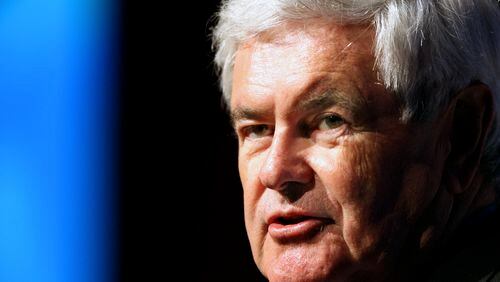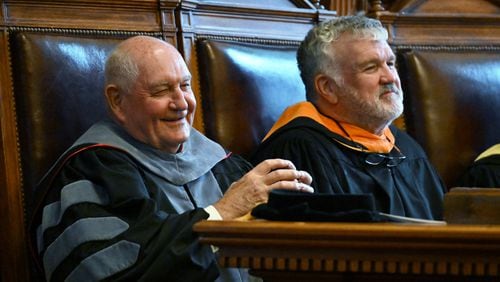The end to the partial federal shutdown could be more than a month away for 16,000 U.S. government employees working in Georgia without compensation or going without a paycheck
That's an estimate from former U.S. House Speaker Newt Gingrich, who predicted during an interview on NPR that the showdown between President Donald Trump and Democrats could run through mid- to late February.
“Nobody’s tired enough” to seek a halt to the fight over the most effective way to ensure border security, Gingrich said.
Trump has called for building a barrier on the nation’s southern border at a cost of $5.7 billion. Democrats, led by House Speaker Nancy Pelosi and Senate Minority Leader Chuck Schumer, say there are better and less expensive ways to guard the border.
“Pelosi’s feeling her oats,” said Gingrich, a Trump ally. “She’s a brand-new, first re-elected speaker since Sam Rayburn in 1954. So she has no reason right now to be reasonable.
“Schumer, basically, is tied to her. He is the tail on the kite, and she’s the kite. And Trump is genuinely determined to protect the southern border.”
Gingrich speaks with some authority on the matter, since he played the foil to President Bill Clinton in 1995 and 1996 in what had been the longest shutdown, at 21 days, before the current stoppage.
The former Georgia congressman points to the ‘95-‘96 shutdown with some pride.
“It led to an agreement with Clinton that led to welfare reform, the largest capital gains tax cut in history and four straight balanced budgets for the only time in your lifetime,” he said. “And we wouldn’t have gotten to them without the level of intensity.”
Missed opportunity? U.S. Rep. David Scott of Atlanta was apparently among the centrist Democrats that the White House said were invited for a lunch meeting this past week with President Donald Trump to discuss the shutdown showdown.
Trump had hoped to sway the Democrats to come to his side in the fight over building a wall on the southern border, and Scott seemed like at least a reasonable option. He has indicated in the past that he’s open to working in some cases with Trump, a former classmate at the Wharton School at the University of Pennsylvania.
But none of the Democrats attended the meeting.
It may have been a matter of execution.
A spokeswoman for Scott said he never received the invitation.
U.S. Rep. Doug Collins, R-Gainesville, did attend, along with eight other GOP lawmakers.
On one hand, on the other hand: Back during the governor's race, Republican Brian Kemp used to get his crowds going by saying his opponent, Democrat Stacey Abrams, wanted "people here illegally" to be able to cast ballots.
The race is over — although there could be a second heat in 2022 — but the issue hasn’t gone away.
Abrams helped keep it alive during a recent appearance on PBS' "Firing Line With Margaret Hoover." The host asked Abrams what she thought about a San Francisco policy that allows some noncitizens to vote in local races.
Her answer was far from definitive.
“I think there’s a difference between municipal and state and federal. Part of the municipality — I’m not arguing for it or against it, but I will say, having been deputy city attorney, there is a very — the granularity of what cities decide is so specific as to, I think, allow for people to be participants in the process without it somehow undermining our larger democratic ethic that says that you should be a citizen to be a part of the conversation.”
Hoover sought some clarification, asking, “So in some cases you would be supportive of noncitizens?”
Here’s Abrams’ answer:
“I wouldn’t be, I wouldn’t oppose it. I mean, I actually think that there are some cases where 16-year-olds should be allowed to cast their vote and cast their ballot. I think school board elections where kids actually got to speak to the effect of the decisions made by the school board members — the effect it has on their education, I think there is legitimate argument for having that conversation. I haven’t decided where I stand on it, but I think that’s a conversation we need to have.”
Prized company: Meanwhile, Abrams' high national exposure during the governor's race has made her doorstep a destination for aspiring candidates for the Democratic presidential nomination in 2020.
Politico reports that Abrams and Andrew Gillum, the runner-up in last year's race for Florida governor, are a "must-call" for any Democrat with eyes on the White House.
It’s not just their endorsements that the presidential hopefuls seek. Their donor and volunteer lists could be key in winning the Southeast’s two most populous states, where Democratic victories could be enough to gain the presidency.
The attention Abrams and Gillum are attracting, Politico wrote, “is an indication of the growing pull of the party’s progressive base and highlights the role each could play as gatekeepers for African-American and liberal voters.”
So far, Abrams has said she’s not taking sides. But she also is in a state of flux while trying to decide whether to run against U.S. Sen. David Perdue in 2020 or Kemp in 2022.
Where the action will be: Georgia's two most interesting congressional races in 2020 could be in the same places as the most interesting contests in 2018.
Larry Sabato's Crystal Ball has tagged the state's 7th Congressional District a toss-up. That's where the ballot counting went into overtime before Republican U.S. Rep. Rob Woodall outlasted Democrat Carolyn Bourdeaux.
Sabato, a University of Virginia political scientist, has tagged Georgia’s 6th Congressional District — where Republicans Gingrich, Johnny Isakson and Tom Price used to dominate races — as “leans Democrat.” The seat is now held by Lucy McBath, a Democrat from Marietta who bested then-U.S. Rep. Karen Handel in November.
The congressional campaign operations for both Republicans and Democrats have already focused attention on the two districts for the contests two years away.
The Hill newspaper reports that McBath's seat is one of 31 that the National Republican Congressional Committee has targeted and has already started "a recruitment process that will have a heavy emphasis on female candidates."
Meanwhile, the Democratic Congressional Campaign Committee tried to blame Woodall in a press release about Delta Air Lines' report that it has suffered $25 million in lost revenue because of the federal shutdown. How? By voting against House Democrats' recent bills to reopen the government.
An LGBTQ 'army of five': Georgia has more state legislators who are openly LGBTQ than ever, and that makes it a leader in the South.
With the election of Matthew Wilson in a Brookhaven-based district, at least five members of the state House are LGBTQ, Project Q's Patrick Saunders reports.
The others are state Reps. Park Cannon of Atlanta, Karla Drenner of Avondale Estates, Sam Park of Lawrenceville and Renitta Shannon of Decatur.
All five of the legislators are Democrats.
The head of the LGBTQ Victory Fund, Houston Mayor Annise Parker, noted that “you would have to travel 520 miles north or 900 miles west to find a state with the same number of out LGBTQ state legislators.”
“With a larger LGBTQ legislative caucus comes more influence and more political power,” Parker said. “We know that when LGBTQ elected officials are in the room, it humanizes our lives, changes political debates and leads to more inclusive legislation. Georgia is behind most states in pro-equality laws and policies, but this army of five will undoubtedly begin to change that.”
An idea rising up the charts: Did you know ISIS has a "music production wing"?
Anthony Lemieux did.
He’s the director of Georgia State University’s Global Studies Institute and a member of its Transcultural Conflict and Violence Initiative, which makes for a hell of a business card.
Lemieux has been working with a professor of music from City College of New York and a mobile design firm to develop a music recognition tool that can screen for ISIS propaganda online.
The key is the soundtrack.
“If a video has music embedded in it that is a product of the Islamic State’s music production wing of their media outfit, then it would really be something that should be screened further and most likely taken offline,” Lemieux said.
He says his team has shared its ideas with entities such as Facebook and the Home Office in the U.K. that have made removing terrorist content a top priority.
Capitol Recap
Here's a look at some of the political and government stories that The Atlanta Journal-Constitution's staff broke online during the past week. To see more of them, go to http://www.myajc.com/georgia-politics/.
About the Author








